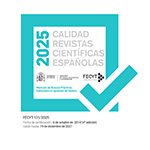It is forbidden To Die in Madrid: Spanish diplomatic censorship in the worldwide persecution of an anti-Franco film (1962-1967)
Abstract
In the 1960s the Spanish foreign service monitored and persecuted the film To die in Madrid across the world. The present work reconstructs and analyzes this experience of diplomatic censorship, with data extracted from the archives of the Ministry of Foreign Affairs and the Ministry of Information and Tourism of the Spanish administration. The article describes the complex negotiations and conflicts that the Spanish diplomats had with politicians and the Armed Forces, film businessmen and cinematographic critics from different countries. The film was interpreted by the Franco regime as an anti-Hispanic affront that was part of a historical series of events intended to damage the nation’s prestige. However, the persecution ended when the foreign service itself concluded that diplomatic pressures had given rise to public scandals that were damaging the image that the dictatorship was trying to build abroad.
Downloads
Article download
License
In order to support the global exchange of knowledge, the journal Cuadernos de Historia Contemporánea is allowing unrestricted access to its content as from its publication in this electronic edition, and as such it is an open-access journal. The originals published in this journal are the property of the Complutense University of Madrid and any reproduction thereof in full or in part must cite the source. All content is distributed under a Creative Commons Attribution 4.0 use and distribution licence (CC BY 4.0). This circumstance must be expressly stated in these terms where necessary. You can view the summary and the complete legal text of the licence.











